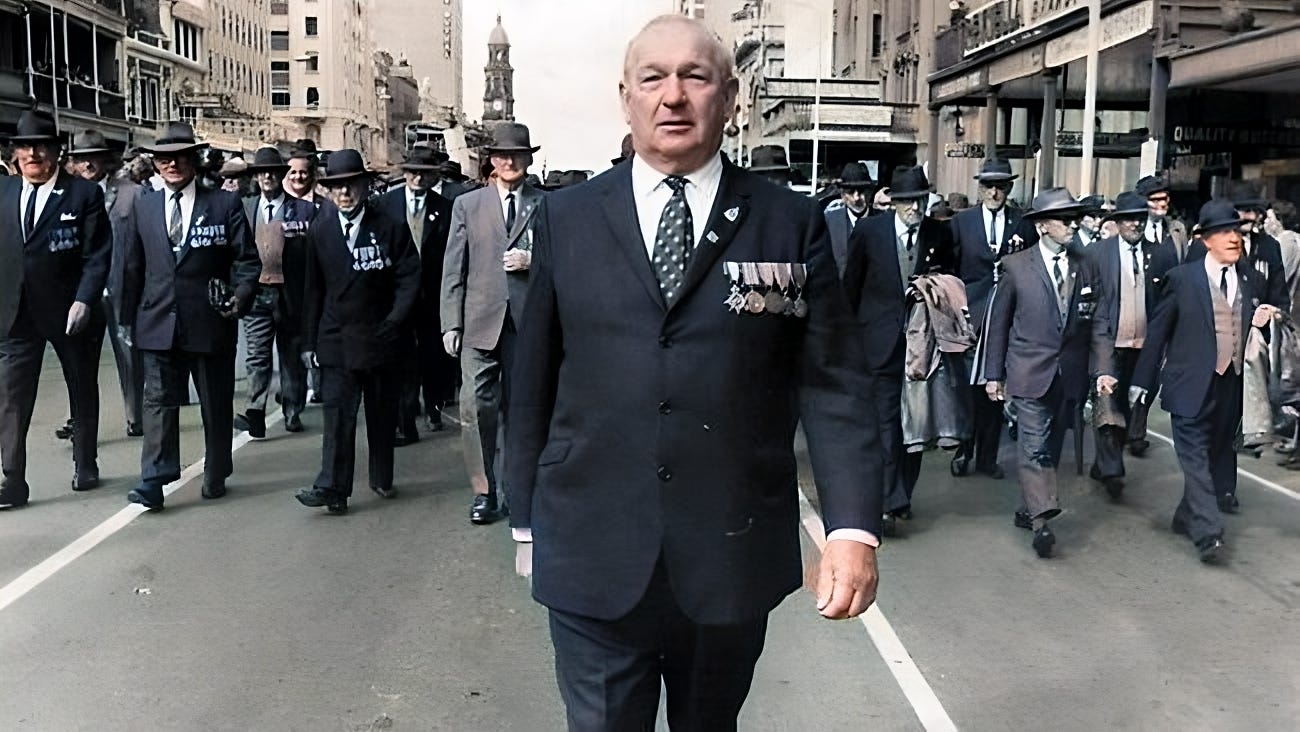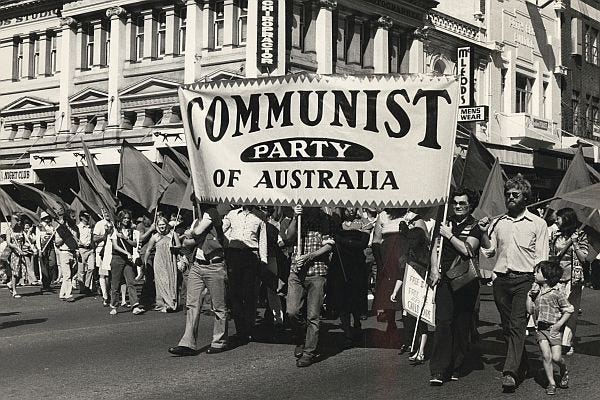
Written by John Lawson, find more of his content on 𝕏 @JohnLawson_TNO
Australia is in a bad state.
Immorality is rampant and mainstream, Christianity is in precipitous decline, our national sovereignty is a joke, and most irreversibly our nation’s Anglo-Celtic & European founding stock is on track to extinction within only a few decades if current immigration and birth rates continue. All this has come about because the commonwealth, created by White Australians for their own benefit and the benefit of their children, has been stolen by an elite class who now oppose the original founding principles. If we wish to prevent the myriad injustices currently being inflicted against Australia, Christians, nationalists and more broadly the dissident-right must regain control of the Commonwealth. This article is dedicated to describing how we will go about accomplishing this seemingly impossible task.
Before I can begin, it is essential to first demonstrate that Australian liberal democracy does not function in the way you have been told it does, the changes that have befallen our nation did not come about through happenstance, and it certainly did not come about through consideration of the popular will. The Australian society we live in today has been crafted from top to bottom by the direct decisions of our elite class. Dr Frank Salter & Harry Richardson’s book ‘Anglophobia’ details countless examples of how this elite class, and its changing composition, have ruinously steered the course of the nation to our current position.
Former Labor MP of Australia’s largest electorate Graeme Campbell also succinctly describes the hostile shift in Australia’s elite class in his book ‘Australia Betrayed’,
“Australian leadership elites in politics, the bureaucracy, academia, big business, the churches and the media have effectively cut themselves adrift from the interests of the majority of Australians. Many have betrayed the trust of the people they are supposed to represent.
As part of this process the elites, while they may mouth concern for the country, have given up thinking in terms of the national interest to pursue an internationalist agenda. This agenda is eroding the foundations of our nation and marginalising the majority, which has less and less say in its own destiny.
The bulk of the media, charged with a watchdog role in the public interest, have become active agents in this process. Academics, artists and others who are supposed to be independent-minded have become propagandists and intellectually corrupt hirelings.”
This constellation of decision-making institutions listed by Mr Campbell is what I refer to simply as the ‘Australian Regime’.
Contrary to the popular myth, real power is not held by the majority population who elect and depose their own leaders at the ballot box. All power in any modern mass society is monopolised by the private and governmental elite. Consider our political parties, for instance, no candidate can retain their endorsement without maintaining strict obedience to the party’s leadership. Similarly, in the cultural arena, those who express a worldview departing from the mainstream consensus on controversial but important topics such as race for example are aggressively expelled from the most prestigious and powerful private institutions. I have further detailed the undemocratic manner in which Australia’s elite class disincentivises organised political dissent in my article ‘Democracy as Regime’, but for the purposes of this article, it suffices to recognise that the general population has next to no influence over how the country is operated.
It is not the popular opinion that drives the actions of our state and the consistent unpopularity of mass immigration paired with the decades of climbing immigration rates is proof enough of this fact. American Paleo-Conservative intellectual Paul Gottfried gives an alternate explanation for the departure of our supposedly democratic decision-making process from the popular will in his book ‘After Liberalism’,
“In Western Europe and North America, this state rests its power upon a multitiered following: an underclass and now middle-class welfariate, a self-assertive public sector, and a vanguard of media and journalistic public defenders. Upon the basis of this following, the regime and its apologists have been able to marginalize their opposition.”
Taking this into account certain avenues must be considered firmly closed to those attempting to usurp the presently prevailing Australian regime. As it stands, the dissident-right has near to no resources, limited manpower, and weak organisational abilities, all while the regime is ruthlessly opposed to our ideology and holds a death grip on power. Any attempt to change this country will necessarily be an asymmetric conflict so trying to face the enemy face-on, wearing a team uniform and announcing your intention to bring about the downfall of the regime in advance is the strategic equivalent of trying to fight the US military with nothing but a slingshot in hand and a kick-me sign on your back. In contrast, the only strategies that will work will necessarily look much more like how the current ruling elite worked their way into power and less like the failed far-right street gangs and protest groups of the past.
A notable example worth examining is Australia’s most successful radical political movement - Communism. Historian Stuart McIntyre has recorded in depth how at the height of their power Australian communists successfully took over the leadership of several worker’s unions, embedded themselves so deep within the Australian Labor Party they temporarily caused it to splinter in two and founded their own party explicitly running and winning elections on communist talking points. While the overwhelmingly anti-communist Australian elite & security agencies of the time tried every option in their power to harass and strangle the incipient political movement, there was no end to the supply of zealous new radicals signing up for the cause. It was only the decline and collapse of the Soviet Union and with it the credibility of the ideology that concluded the power of the movement - a factor we Australian nationalists thankfully do not have to contend with. Developing a similarly broad range of serious attempts to claim power from the Australian regime must be placed as a top priority for the Australian dissident-right if we wish to achieve even a fraction of Australian communism’s success.
Acquiring enough power to overturn the presiding regime may appear a herculean task, but we have certain advantages today that our predecessors did not, of these the most crucial is the democratisation of the media landscape brought about through the proliferation of social media and the smartphone. While the established academic institutions, media and lobbies retain a relatively high barrier of entry we have another great advantage in the relative disinterest in politics among the Australian population compared to America and Europe. This fact combined with our declining political participation means obtaining a position within, and scaling the rungs of establishment politics, has never been so easy. A friend of mine often repeats the adage ‘there are only 40 young liberals in each state’, a reference to the fact that only a tiny fraction of the Young Liberal’s on-paper membership is actively engaged in politics, and by extension, qualified to ascend to higher ranks within the party.
The best use of resources and manpower is thus for members of the Australian dissident-right to gain positions of influence in major, politically relevant institutions with a focus on the Coalition. This can include getting a job in conservative media, studying law, becoming a political staffer and eventually standing as a candidate at election time. This process can be accelerated by cautious networking.
As people rise through the party, it is inevitable some will be discovered to hold inconveniently right-wing beliefs and consequently suffer expulsion. It would be highly beneficial for these individuals to found a nationalist minor party focussed on winning local council elections running on a localist, NIMBY & cultural conservative platform, under the leadership of the individual with the most experience.
It would be financially irresponsible and strategically inept for this nationalist minor party to attempt to run candidates at the federal or state level, there have been early demonstrations of success for this model from the UK’s Homeland Party and Ireland’s National Party. The focus should be on building the best possible reputation by efficiently operating local government to the benefit of the constituents. This could be achieved by lowering rates, improving the efficiency of services and even replacing the ugly council-sponsored art installations that now litter many suburbs with pieces that make constituents proud of their suburb. These details are not especially important for now.
The gradual establishment of this nationalist minor party will lay the foundations for a true alternative.
While some are quietly working their way into a position within the Coalition whereby they can become a member of parliament, others will leaflet, campaign and generally work to expand the nationalist minor party. In a best-case scenario, slowly an ascendant dissident-right faction will take over all key positions within the Liberal and National parties, converting them into true representatives of Australia’s interests.
In a far more likely scenario, we will reach a point of diminishing returns at which no further ground can be gained within the Coalition, once this point is reached, whether it is when we have only a handful of MPs onside or half the parliament, a coordinated defection from the Coalition can be made by all those who hold dissident-right convictions to the nationalist minor party which has slowly been constructed over years. Unlike previous minor party projects, our theoretical nationalist minor party would already have existing infrastructure and political experience. This will instantly create a force capable of rivalling the Coalition in terms of credibility and professionalism.
From this point onwards, the task is simple - all hands on deck to expand the nationalist splinter party to a point where it completely replaces the now fragile and discredited Coalition. From here it is a very short road to major party status, and by extension, the prime ministership.
Where to begin?
There are not nearly enough Australians able or willing to dedicate their life to working to displace the traitorous elites governing our country or preventing the irreversible and destructive forces they are inflicting on the nation. This means the first order of business is to raise awareness of the problems our country is facing, in other words, we need to produce coherent and professional media to redpill the masses. If you appreciate the work the National Observer is doing in this domain and would like to assist us to reach the next level we would greatly appreciate your monetary support.
For those who already agree and are interested in being involved in the solution, I encourage joining any right-wing major party, keeping your cards close to your chest, and working to ascend to a point where you can stand at elections. Of course, others need to place themselves in supporting roles; we need political staffers, economists, lawyers, academics, and those working towards owning their own businesses or developing a disposable income they can commit to funding political projects.
Organisations and institutions must simultaneously be built up by those willing and able to explain our worldview publicly. We need other institutions for more explicit ideological support and independent action outside of any political parties as well. These include media properties such as the National Observer, ethnic lobbies and think tanks such as the British Australian Community and fraternities such as the Australian Natives Association. Participating in any of these, while also being a member of a party and building a career do not, in general, need to be mutually exclusive actions.





We need more of this kind of thinking and less "X nation is finished" type content.